Unlocking the untapped potential of youth in clean cooking: A look back at the 2022 Clean Cooking Forum
Ninety percent of the world’s 1.8 billion youth live in developing countries where 2.4 billion people still rely on polluting fuels and stoves to cook their food. Given the scale and negative impact this has on people and the planet, young people around the world are increasingly recognizing clean cooking as a critical cross-cutting solution to global climate, environment, health, and gender equality challenges.
“Clean Cooking is a youth issue. 90% of the world’s youth live in regions with the lowest access to clean cooking. This disproportionately impacts youth education, employment, and health.” – Katja Lasseur, Deputy Head of Mission at the Embassy of the Netherlands in Ghana, at the Forum’s Opening Plenary
Youth are taking action – as entrepreneurs, activists, researchers, and more – to raise awareness and improve access to clean cooking solutions in their communities and countries, but often lack reliable access to youth-inclusive opportunities to participate as equitable stakeholders across the clean cooking ecosystem.
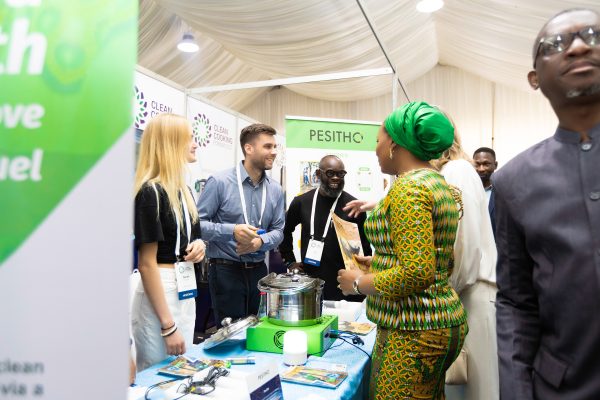 Photo courtesy of the Clean Cooking Alliance at the Clean Cooking Forum 2022
Photo courtesy of the Clean Cooking Alliance at the Clean Cooking Forum 2022
First-ever youth delegation at the Clean Cooking Forum 2022
In October 2022, The Clean Cooking Alliance (CCA) partnered with Student Energy to support a delegation of 20 global youth to participate in the Clean Cooking Forum in Accra, Ghana.
The Clean Cooking Forum is the sector’s flagship event, convening leading policymakers, entrepreneurs, investors, donors, and other key partners working towards achieving clean cooking for all and accelerating progress toward global development and climate goals. The addition of a youth delegation to the Forum recognizes and celebrates the vital role of youth in realizing these ambitions.
The delegation included 20 diverse participants from 14 countries, identified through Student Energy and CCA’s youth networks. Delegates from across Sub-Saharan Africa, where the lack of clean cooking is particularly pronounced, made up 70% of the youth delegation, and more than 50% of delegates were women, acknowledging the gender equity dimensions of the issue.
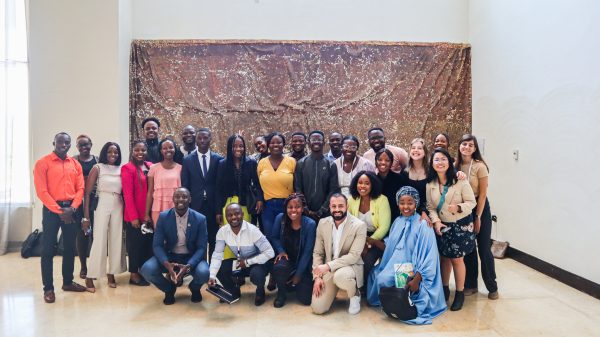
Delegates not only had the opportunity to attend the Forum plenary and breakout sessions, innovation expo, and networking receptions, but many of the youth delegates participated as speakers, moderators, and exhibitors throughout the three-day event. For example, the session, “Changemakers of Today: Youth Advancing Sustainable Action,” featured a panel of six young entrepreneurs and innovators discussing how they are tackling clean cooking challenges and the support youth need to scale their efforts.
“From where I stand, clean cooking is not just about food. It transcends the goings-on confined to the kitchen and spills into health, gender equality, economic gains and sustainable societies.”- Cherop Soy, Ecowarrior Kenya and Youth Delegate at the 2022 Clean Cooking Forum
Student Energy supported delegates with preparatory and interactive webinars focused on presentation and networking skills, and provided on-site support and a post-event debrief. Delegates were able to share their expertise through speaking engagements, engage in discussions about youth involvement in decision-making, and help spread the forum’s key messaging by taking on communication roles. The active involvement of young people at the forum led to greater ambition from stakeholders in collaborating with them on clean cooking initiatives.
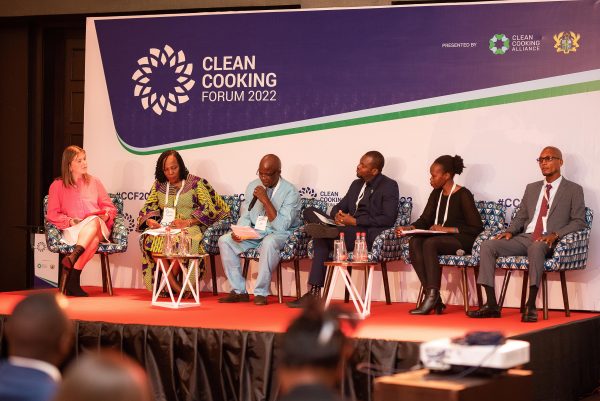 Photo courtesy of the Clean Cooking Alliance at the Clean Cooking Forum 2022
Photo courtesy of the Clean Cooking Alliance at the Clean Cooking Forum 2022
Intergenerational Roundtable on Youth Engagement in Clean Cooking
On the final day of the Clean Cooking Forum, an Intergenerational Roundtable on Youth Engagement in Clean Cooking brought together eminent senior leaders from the clean cooking sector to engage in dialogue with the youth delegation and other youth attending the Forum. The Roundtable was designed to showcase the emerging talent of young changemakers to participate in clean cooking transitions, understand the challenges young people are encountering in the sector, and discuss how senior leaders can support youth-led change and create an enabling and inclusive environment for youth to acquire, develop and utilize their skills.
More than 15 youth participants were joined by senior leaders, including H.E. Samira Bauwmia, Second Lady of the Republic of Ghana Dymphna van der Lans, CEO of Clean Cooking Alliance; Sheila Oparaocha, Director of the ENERGIA Network; and Mohan Das Manandhar, Chairperson at Sustainable Prosperity Initiative Nepal, in an interactive discussion facilitated by Jaff Marilyn Bongmo, a youth delegate from Cameroon.
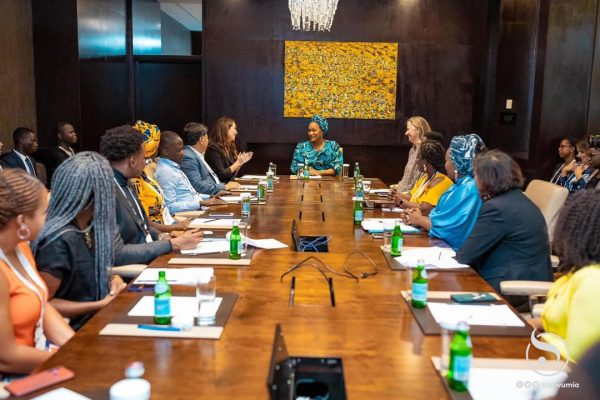 Photo courtesy of the Clean Cooking Alliance at the Clean Cooking Forum 2022
Photo courtesy of the Clean Cooking Alliance at the Clean Cooking Forum 2022
The lively dialogue explored why inclusive youth participation is vital for achieving universal access to clean cooking and the challenges youth currently face in having their voices heard, getting a seat at decision-making tables, and accessing opportunities for meaningful engagement.
Participants discussed a variety of ways to increase intergenerational collaboration, empower youth leaders, and support education and capacity-building activities in the clean cooking sector.
“Clean Cooking is a youth issue. First and foremost young people need to be creative participants and at the center of solutions. Young people also benefit from clean cooking from access to health, education and employment opportunities.” – Helen Watts, Executive Director of Student Energy
Youth Delegation Calls to Action
Following the Forum, the Youth Delegation developed the following calls to action, which focus both on what youth themselves can do to effectively self-organize and increase momentum behind this cause, and what organizations and decision-makers should do to ensure that youth are meaningfully included across the clean cooking ecosystem:
- Stakeholders in the clean cooking sector should proactively work to ensure that youth are equally represented at the table and have their core needs met, in able to meaningfully participate.
- Capacity building for youth does not end with providing skills training. Youth must also be provided with industry opportunities to use these skills and connect them to the market.
- Stakeholders across the clean cooking ecosystem must recognize and work to remove barriers that limit the participation of youth, women, and marginalized communities, actively creating incentives and opportunities for inclusive engagement, training, and employment in the clean cooking sector.
- Established leaders in the clean cooking sector should leverage the power of youth as changemakers and innovators: this can be particularly valuable in the form of mentorship, which is a two-way learning process.
- There is no one way to contribute to clean cooking. Young people should seek actionable ways to participate in clean cooking, leaning into their unique skills and expertise – as entrepreneurs, engineers, storytellers, artists, and beyond.
- Young people should collaborate to form a unified effort, which requires working at a grassroots level with students and other youth and being ready to present clearly defined, data-driven asks when they have seats at the decision-making table or a chance to speak directly with established leaders.
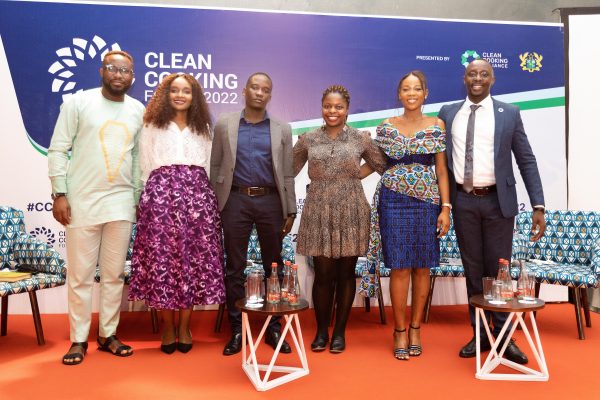 Photo courtesy of the Clean Cooking Alliance at the Clean Cooking Forum 2022
Photo courtesy of the Clean Cooking Alliance at the Clean Cooking Forum 2022
Youth Insights Feature: Check out youth delegate Cherop Soy’s blog post “What Clean Cooking Isn’t” for more insights gathered by young people at the forum on clean cooking.
Conclusion: Clean cooking is a youth issue
The Clean Cooking Forum 2022, placed young changemakers at the forefront of the clean cooking dialogue, with youth and senior leaders aligned on the urgent need for action and the essential role young people will play in achieving universal access.
“The places where the biggest gaps on clean cooking have the highest youth populations. Youth are on the ground and have the knowledge to bring”. –Akil Callendar, Youth Specialist at Sustainable Energy for All (SEforALL), at the Forum’s Youth Closing Plenary
CCA continues to recognize the vital role of youth in achieving universal access to clean cooking and has recently undertaken a youth consultation process and interactive webinar to inform its forthcoming youth engagement strategy.
Student Energy is excited to continue working with CCA in 2023 and beyond in expanding the youth engagement agenda in clean cooking. Stay tuned for more exciting announcements and activities to help youth act and lead on clean cooking in their countries and communities.
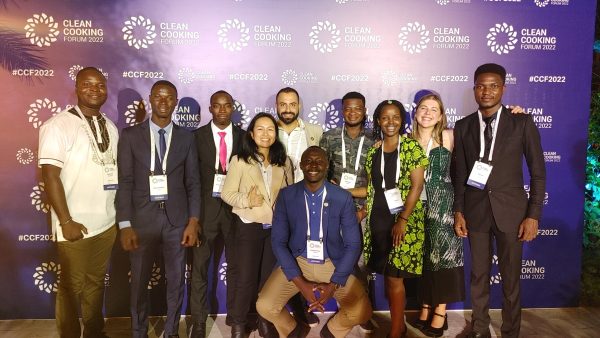
Clean Cooking Alliance (CCA) works with a global network of partners to build an inclusive industry that makes clean cooking accessible to the three billion people who live each day without it. Established in 2010, CCA is driving consumer demand, mobilizing investment to build a pipeline of scalable businesses, and fostering an enabling environment that allows the sector to thrive.
Clean cooking transforms lives by improving health, protecting the climate and the environment, empowering women, and helping consumers save time and money.
Student Energy is a global youth-led organization empowering young people to accelerate the sustainable energy transition through a variety of initiatives, including university-based Chapters, a digital Energy System Map that has reached over 13 million views, and the largest student-led energy conference in the world. Student Energy works with a network of 50,000 young people from over 120 countries to build the knowledge, skills, and networks they need to take action on energy.